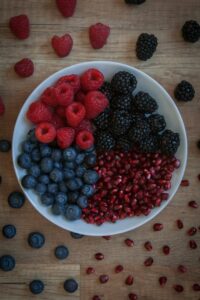Berries are a win-win!
Not only are they among the healthiest foods on the planet, they’re delicious and can be used in a variety of ways.
These small, brightly colored, pulpy fruits don’t have a pit or stone, but many do contain seeds.
The most commonly consumed berries here in the U.S. include blueberries, strawberries, raspberries, blackberries, cranberries, and currants. Lesser used varieties (but gaining in popularity) include goji berries, acai berries, and bilberries.

Ways to Include Berries
Berries can be eaten alone as a healthy snack or used in a variety of plant-based recipes such as pancakes, muffins, smoothies, and "nice cream" (scroll down to see the video link for Very Berry Nice Cream).
They’re also a wonderful topping for oatmeal and salads.
Berry Benefits!
Here are just a few of the health benefits berries deliver:
- Can Help Prevent Dementia. Blueberries (and other blue or purple fruits and berries) contain powerful plant polyphenols called anthocyanins, which are capable of localizing in the “learning and memory” regions of our brains. Higher consumption of blueberries has been shown to not only improve the memory in older adults, but to also significantly slow the rate of cognitive decline by as much as 2.5 years.
- Relieves Inflammation and Osteoarthritis. Once again, it’s those protective anthocyanins (the brightly colored pigment in berries) to the rescue. Berries can dramatically combat pro-inflammatory genes, thereby providing anti-inflammatory effects and reducing pain. One study showed that diabetics who were given strawberries for six weeks saw their CRP levels (a marker of systematic inflammation) drop by 18%.
- Fights Against Oxidative Stress. And that’s important because long-term oxidative stress contributes to many serious health issues (heart disease, stroke, diabetes, chronic fatigue, cancer, and much more). Oxidative stress occurs when there’s an imbalance of free radicals (unstable, damaging molecules) and antioxidants in the body. Antioxidants, however, stabilize or neutralize those free radicals and protect us from oxidative stress. Berries (and other foods high in flavonoids and vitamins A, C, and E) are rich sources of antioxidants.
Various types of berries contain slightly different nutrients, so be sure to mix them up in your diet. Fresh berries are great in season, but frozen berries are available year-round!
I like to purchase large bags of frozen organic berries at Costco and other chains. Choosing fresh or frozen is always better than dried berries, which contain more sugar and a lower nutrient profile.
Ready to make Very Berry Ice Cream? Watch the Video Here!
Free Webinar: 3 Food Mistakes that Lead to Painful Joints, Extra Pounds, and Health Problems the Doctors Aren't Solving
Signed copies of the award-winning book: The "Plan A" Diet - Combining Whole Food, Plant Based Nutrition with the Timeless Wisdom of Scripture
Then God said, “Let the earth produce vegetation: plants bearing seeds, each according to its own type, and fruit trees bearing fruit with seeds, each according to its own type.” And so it was. (Genesis 1:11, GW)
(Updated 5-26-24)